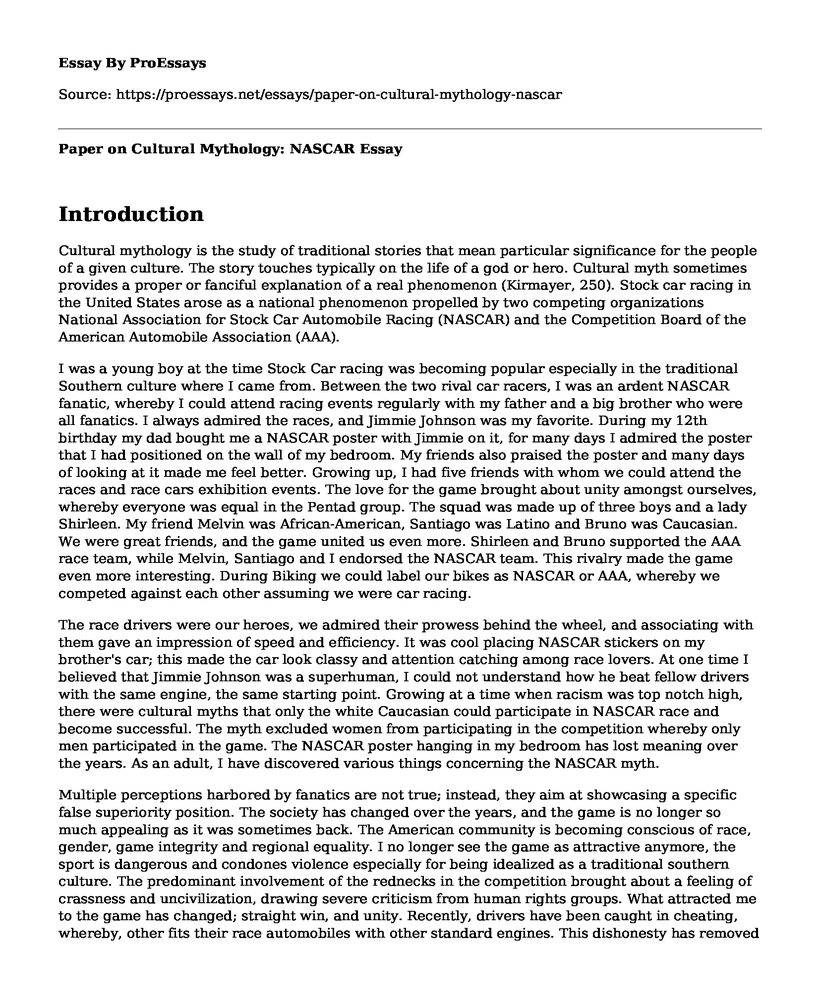Introduction
Cultural mythology is the study of traditional stories that mean particular significance for the people of a given culture. The story touches typically on the life of a god or hero. Cultural myth sometimes provides a proper or fanciful explanation of a real phenomenon (Kirmayer, 250). Stock car racing in the United States arose as a national phenomenon propelled by two competing organizations National Association for Stock Car Automobile Racing (NASCAR) and the Competition Board of the American Automobile Association (AAA).
I was a young boy at the time Stock Car racing was becoming popular especially in the traditional Southern culture where I came from. Between the two rival car racers, I was an ardent NASCAR fanatic, whereby I could attend racing events regularly with my father and a big brother who were all fanatics. I always admired the races, and Jimmie Johnson was my favorite. During my 12th birthday my dad bought me a NASCAR poster with Jimmie on it, for many days I admired the poster that I had positioned on the wall of my bedroom. My friends also praised the poster and many days of looking at it made me feel better. Growing up, I had five friends with whom we could attend the races and race cars exhibition events. The love for the game brought about unity amongst ourselves, whereby everyone was equal in the Pentad group. The squad was made up of three boys and a lady Shirleen. My friend Melvin was African-American, Santiago was Latino and Bruno was Caucasian. We were great friends, and the game united us even more. Shirleen and Bruno supported the AAA race team, while Melvin, Santiago and I endorsed the NASCAR team. This rivalry made the game even more interesting. During Biking we could label our bikes as NASCAR or AAA, whereby we competed against each other assuming we were car racing.
The race drivers were our heroes, we admired their prowess behind the wheel, and associating with them gave an impression of speed and efficiency. It was cool placing NASCAR stickers on my brother's car; this made the car look classy and attention catching among race lovers. At one time I believed that Jimmie Johnson was a superhuman, I could not understand how he beat fellow drivers with the same engine, the same starting point. Growing at a time when racism was top notch high, there were cultural myths that only the white Caucasian could participate in NASCAR race and become successful. The myth excluded women from participating in the competition whereby only men participated in the game. The NASCAR poster hanging in my bedroom has lost meaning over the years. As an adult, I have discovered various things concerning the NASCAR myth.
Multiple perceptions harbored by fanatics are not true; instead, they aim at showcasing a specific false superiority position. The society has changed over the years, and the game is no longer so much appealing as it was sometimes back. The American community is becoming conscious of race, gender, game integrity and regional equality. I no longer see the game as attractive anymore, the sport is dangerous and condones violence especially for being idealized as a traditional southern culture. The predominant involvement of the rednecks in the competition brought about a feeling of crassness and uncivilization, drawing severe criticism from human rights groups. What attracted me to the game has changed; straight win, and unity. Recently, drivers have been caught in cheating, whereby, other fits their race automobiles with other standard engines. This dishonesty has removed fairness from the game, and the perceived prowess is just a fuss.
In 2006, for example, my favorite driver Jimmie Johnson was suspended before the Daytona 500. His car had flunked a technical inspection. Stock car race has been faced with other irregularities in history, including efforts by sharp minded crew chiefs to play dirty. Until recently the game's rulebook was ambiguous providing loopholes for cheating. Once a renowned driver Darrell Waltrip said;
If you do not cheat, you look like an idiot. If you cheat and don't get caught you look like a hero. If you cheat and get caught you look like a dope. Put me where I belong (Jensen, 5).
Conclusion
The change of meaning for the NASCAR poster is largely because of the bad things associated with the game. What I once viewed as a source of inspiration and efficiency is no longer appealing. For me, it is just another poster that I hardly take note of, and I don't think I would encourage my son or daughter to like the game. The NASCAR poster with Jimmie Johnson on it no longer appeal to my friends anymore. Sometimes they visit me during holidays, and the enthusiasm is no longer there. The society we are living in has become more conscious of social justice, fairness and integrity. A piece of art that signifies injustices or wrongdoings is seen as a constant reminder of how not to live life.
Work Cited
Kirmayer, Laurence J. "Cultural competence and evidence-based practice in mental health: Epistemic communities and the politics of pluralism." Social science & medicine 75.2 (2012): 249-256.
Tom Jensen. "Five Myths about NASCAR". Washington Post, 2018, https://www.washingtonpost.com/opinions/five-myths-about-nascar/2015/02/19/44a6ee00-b7ab-11e4-aa05-1ce812b3fdd2_story.html?utm_term=.7431b4dc395e. Accessed 20 Mar 2018.
Cite this page
Paper on Cultural Mythology: NASCAR. (2022, Apr 04). Retrieved from https://proessays.net/essays/paper-on-cultural-mythology-nascar
If you are the original author of this essay and no longer wish to have it published on the ProEssays website, please click below to request its removal:
- How the MMM Affects Asian American Women Essay
- Hong Kong's Family Structure and Living Patterns - Essay Sample
- Essay Example on American Art: Exploring Gender, Native American & Colonist Identity
- Essay Example on Cancel Culture: A Double-Edged Sword
- American Indians: Uncovering the Impact of Western Civilization on Identity - Essay Sample
- Essay Example on Muharem's Support System: Friend, Wife & Hospital Help
- Paper Sample on Cultural Diversity: Uniting Humanity Through Cuba's Example







